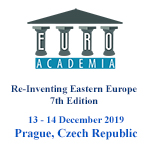Euroacademia Conferences
 Europe Inside-Out: Europe and Europeanness Exposed to Plural Observers (9th Edition) April 24 - 25, 2020
Europe Inside-Out: Europe and Europeanness Exposed to Plural Observers (9th Edition) April 24 - 25, 2020 Identities and Identifications: Politicized Uses of Collective Identities (9th Edition) June 12 - 13, 2020
Identities and Identifications: Politicized Uses of Collective Identities (9th Edition) June 12 - 13, 2020 8th Forum of Critical Studies: Asking Big Questions Again January 24 - 25, 2020
8th Forum of Critical Studies: Asking Big Questions Again January 24 - 25, 2020 Re-Inventing Eastern Europe (7th Edition) December 13 - 14, 2019
Re-Inventing Eastern Europe (7th Edition) December 13 - 14, 2019 The European Union and the Politicization of Europe (8th Edition) October 25 - 26, 2019
The European Union and the Politicization of Europe (8th Edition) October 25 - 26, 2019 Identities and Identifications: Politicized Uses of Collective Identities (8th Edition) June 28 - 29, 2019
Identities and Identifications: Politicized Uses of Collective Identities (8th Edition) June 28 - 29, 2019 The European Union and the Politicization of Europe (7th Edition) January 25 - 26, 2019
The European Union and the Politicization of Europe (7th Edition) January 25 - 26, 2019 7th Forum of Critical Studies: Asking Big Questions Again November 23 - 24, 2018
7th Forum of Critical Studies: Asking Big Questions Again November 23 - 24, 2018 Europe Inside-Out: Europe and Europeanness Exposed to Plural Observers (8th Edition) September 28 - 30, 2018
Europe Inside-Out: Europe and Europeanness Exposed to Plural Observers (8th Edition) September 28 - 30, 2018 Identities and Identifications: Politicized Uses of Collective Identities (7th Edition) June 14 - 15, 2018
Identities and Identifications: Politicized Uses of Collective Identities (7th Edition) June 14 - 15, 2018
Mental Mapping of the Western Europe and Its Effects on Public Diplomacy Making: Comparison of Polish and Turkish Public Diplomacy Making Regarding the European Union
-
-

-
Presentation speakers
- Hilal Atmaca, University of Cologne, Germany
Abstract:
Public diplomacy is a type of diplomacy which provides means to create positive image of the country and its society through direct communication with foreign publics; as a result, to achieve its international policy goals easier (Ociepka & Ryniejka-Kieldanowicz, 2005) and to gain soft power (Nye, 2008). My prospective research asks whether the mental mapping of the Western Europe has an impact on public diplomacy making as research question. To answer this question, two different cases of Polish and Turkish public diplomacy making regarding the European Union will be compared with the help of method of agreement. Turkey has sought for full membership to the European Union for many years. Its relatively small territory in the Europe and cultural differences are among critical issues regarding its perception as (non)-European. In this context, Turkey uses public diplomacy to show that it is a part of European culture and identity. On the other hand, Poland, being a full-member to the European Union, whose territory is indisputably in the middle of the Europe, showed several practices in public diplomacy similar to Turkey’s. Although two countries differ in terms of European Union membership, territoriality and culture, both tries to show their “Europeanness” through public diplomacy. In this regard, my prospective research aims to research effects of the mental mapping of Western Europe on these similar outcomes.
-
Related Presentations













